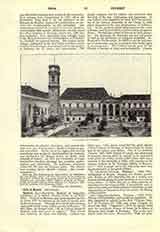

Colbert, JEAN-BAPTISTE, Marquis de Seignelay, statesman, b. at Reims, France, 1619; d. at Paris, 1683. Noticed by Mazarin and recommended by him to Louis XIV he became at the latter’s death, controller of finances. Through the control of finances he organized nearly every public service in France. Of him, Mme. de Sevigne said: “M. de Colbert thinks of finances only and never of religion.” This should not, however, be taken too literally. Colbert was Gerin says: “His sisters controlled the great abbeys of Sainte-Marie de Chaillot, of Sainte-Claire de Reims and of the Lelys near Melun. One of his brothers (Nicolas, 1627-1676) Bishop of Lucian and afterwards of Auxerre, having died, he caused to be appointed in his place his cousin Andre (1647-1702) who was a member of the assembly of 1682, with another of his cousins, Colbert de St. Pouange, Bishop of Montauban.” This passage omits the following three best known kinsmen of the great Colbert.
II.—JACQUES-NICOLAS COLBERT (1655-1707), Archbishop of Rouen. Fisquet (La France pontificale, Rouen, p. 253) describes him as a worthy and learned prelate giving his principal care to the training of his clerics. C. Gerin (loc. cit., p. 188), however, reproaches him for being worldly, a spendthrift, and, in spite of his pompous declarations of orthodoxy, no less sympathetic to Jansenism than his cousin, the Bishop of Montepellier.
III.—CHARLES-JOACHIM COLBERT (1667-1738), Bishop of Montepellier, and a militant Jansenist. He first appeared to submit to the Bull “Vineam Domini” of Innocent XI, 1705, but when Clement XI issued the Bull “Unigenitus“, 1713, he openly sided with the appellants Soanen of Senez, de la Broue of Mirepoix, and Langle of Boulogne. The works published under his name (Montepellier, 1740) are probably, at least in part, from the pen of his advisers, Gaultier and Croz, who are moreover charged with the perversion of their master. In 1702, one of his priests, the Oratorian Pouget, published, at his request, the “Catechisme de Montpellier” a remarkable book but tinctured with Jansenism and condemned by the Holy See, 1712 and 1721.
IV.—MICHEL COLBERT (1633-1702), an ascetic writer and superior of the Premonstrants. His election was somewhat irregular and had to be validated by papal rescript. He is the author of “Lettres d’un Abbe a ses religieux” and “Lettre de Consolation”.
J. F. SOLLIER

